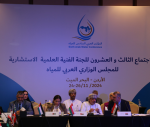You are here
To combat terrorism
Feb 15,2015 - Last updated at Feb 15,2015
The assassination of pilot Muath Al Kasasbeh stirred high expectations regarding Jordan’s response to the brutal crime.
There has even been talk of an offensive, with Jordan leading the ground troops against the terrorist group called Daesh.
One needs to understand, however, that this is not a traditional war between two armies. It is rather like a guerilla war, in which a group of terrorists is spread across a wide geographical area.
Were Jordan to engage directly, it would need to move armies and tanks across its borders.
This unconventional confrontation makes it extremely difficult to predict any aspect regarding timing, location and approach of potential operations.
In 2005, when Abu Musab Zarqawi’s group bombed three hotels in Amman, Jordan did not launch a war against the group that committed the crime. It fashioned a response that ultimately led to the elimination of Zarqawi himself.
It is this kind of alternative response that Jordan is likely to adopt, and which is likely to be most effective.
Meanwhile, the challenges and threats surrounding Jordan are growing by the day.
A strategy to engage and defeat the terrorist groups must be developed and implemented soon. With the UAE suspending its involvement in the coalition after the capture of the Jordanian pilot, the US was forced to make some essential changes, including delaying a rescue mission.
In addition, the UAE requested deployment of US V22 Ospreys in northern Iraq instead of Kuwait, after Turkey refused to host any aircraft.
Adapting the strategy of combatting terrorism to the vision of each country in the region is extremely important.
Countries across the region face almost identical risks and it is not possible for this level of chaos to continue without consequences.
It is imperative, therefore, to have a clear and realistic vision for engaging the terrorists and making them pay for their crimes in order to end their attempts at political exploitation of regional crises.
It is extremely important at this point in time to have an “Arab kitchen” to manage the crisis according to a regional strategy.
It is also imperative to end the ongoing humanitarian crisis in Syria, which only enables terrorist groups to grow and provides fertile ground for recruitment and training.
This is particularly important, as the fight is no longer just military; it is also cultural, educational and social.
Terrorists are not limited to one country; this is a shared issue across the region, which requires a common vision and regional consensus on how to engage and defeat these threats.
Each country must have its internal strategy, but in order to be effective and coherent, all countries should agree on a common regional strategy as well.













